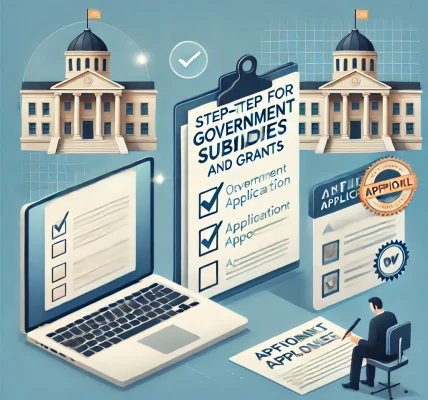Government grants are essential financial aids provided to businesses to promote economic growth, innovation, and social development. These grants can help businesses with funding, expansion, research, and sustainability. In 2025, various industries will have the opportunity to apply for government grants based on their contributions to the economy and societal needs.
In this guide, we will explore the top 10 business sectors eligible for government grants in 2025, including the eligibility criteria, application process, and key considerations to ensure compliance with legal and financial regulations.
1. Renewable Energy and Sustainability
The push for a greener economy has led to increased government funding for businesses in the renewable energy sector. Grants are available for companies involved in:
- Solar, wind, and hydro energy projects
- Energy-efficient technologies
- Sustainable waste management and recycling initiatives
- Electric vehicle (EV) infrastructure and clean transportation solutions
Eligibility:
- Businesses focused on reducing carbon footprints
- Companies involved in renewable energy research and development (R&D)
- Startups with innovative sustainability solutions
2. Technology and Innovation
The tech industry remains a high-priority sector for government grants, supporting:
- Artificial Intelligence (AI) and machine learning applications
- Cybersecurity advancements
- Smart city technologies
- Blockchain and fintech innovations
Eligibility:
- Startups and SMEs in emerging technology fields
- Companies focusing on digital transformation
- Businesses working on AI and automation solutions
3. Agriculture and Agribusiness
Governments are investing in modernizing agriculture to ensure food security and sustainability. Grants are available for:
- Precision farming and agri-tech startups
- Organic and sustainable farming initiatives
- Livestock and aquaculture development
- Supply chain and cold storage advancements
Eligibility:
- Farmers and cooperatives
- Agribusinesses investing in sustainable farming
- Startups bringing innovation to the agriculture sector
4. Healthcare and Biotechnology
With increasing healthcare demands, government grants are available for:
- Biomedical research and development
- Telemedicine and health-tech startups
- Pharmaceuticals and vaccine production
- Mental health and wellness initiatives
Eligibility:
- Medical research institutions and biotech companies
- Health-tech startups focusing on digital health solutions
- Pharmaceutical companies working on new drug development
5. Education and EdTech
Governments are supporting the modernization of education through grants in:
- E-learning platforms and digital education solutions
- STEM education initiatives
- Vocational training and workforce development
- AI-driven learning technologies
Eligibility:
- EdTech startups providing innovative learning solutions
- Institutions focusing on technical and vocational training
- Organizations promoting inclusive education
6. Manufacturing and Industrial Development
The manufacturing sector is a key driver of economic growth. Grants are available for:
- Smart manufacturing and automation
- Sustainable and eco-friendly production processes
- Small and medium-sized manufacturers
- Export-driven businesses
Eligibility:
- Manufacturers investing in Industry 4.0 technologies
- Companies implementing energy-efficient production methods
- Businesses expanding into international markets
7. Tourism and Hospitality
To boost economic recovery post-pandemic, governments are offering grants for:
- Sustainable and eco-tourism projects
- Smart tourism technology integration
- Infrastructure development for tourism hotspots
- Cultural heritage and event promotion
Eligibility:
- Tourism-related businesses focusing on sustainability
- Companies improving digital tourism experiences
- Small businesses in the hospitality industry
8. Small and Medium Enterprises (SMEs) and Startups
Startups and SMEs are the backbone of many economies, and governments are providing grants to support:
- Business incubation and accelerator programs
- Digital transformation and automation
- Women-led and minority-owned businesses
- Expansion and job creation initiatives
Eligibility:
- Registered startups and SMEs with growth potential
- Businesses implementing innovative solutions
- Companies fostering employment opportunities
9. Transport and Logistics
The logistics industry is essential for global trade and commerce. Grants are available for:
- Smart logistics and supply chain management
- Electric and autonomous vehicle adoption
- Infrastructure development for better connectivity
- Digital transformation in freight and cargo management
Eligibility:
- Businesses improving logistics efficiency
- Companies investing in sustainable transport solutions
- Startups innovating in freight and supply chain technology
10. Social Enterprises and Nonprofits
Government grants support businesses and organizations addressing social issues, including:
- Affordable housing and community development
- Women empowerment and skill development programs
- Public health and social welfare initiatives
- Education and employment for underprivileged groups
Eligibility:
- Nonprofit organizations and social enterprises
- Businesses addressing social challenges
- NGOs working in community upliftment programs
How to Apply for Government Grants?
To apply for a government grant, follow these steps:
Step 1: Research Available Grants
- Visit official government websites to find relevant grant programs.
- Consult industry experts or business advisors for guidance.
Step 2: Check Eligibility Criteria
- Ensure your business meets the requirements.
- Prepare the necessary documents, such as business registration, financial statements, and project proposals.
Step 3: Prepare and Submit the Application
- Complete the online or offline application form.
- Provide accurate and verifiable information.
- Attach required supporting documents.
Step 4: Follow Up and Track Application Status
- Monitor the progress of your application.
- Respond to any additional queries from grant authorities.
Step 5: Receive Funds and Ensure Compliance
- Use funds strictly for the intended purpose.
- Maintain transparency and accountability in fund utilization.
- Submit progress reports if required by the grant program.
Final Thoughts
Government grants offer tremendous opportunities for businesses to grow and innovate. By identifying the right grant program and following the application process diligently, businesses can secure essential funding to drive success in 2025. Always ensure compliance with the terms and conditions of the grant to avoid legal complications.
Disclaimer: This guide is for informational purposes only and does not constitute legal or financial advice. Always refer to official government sources for accurate and up-to-date information.



